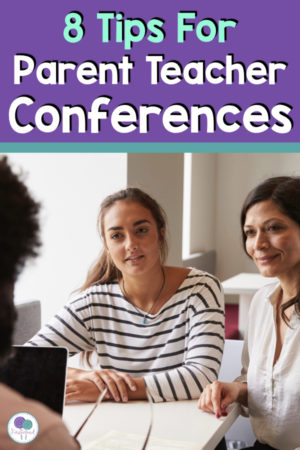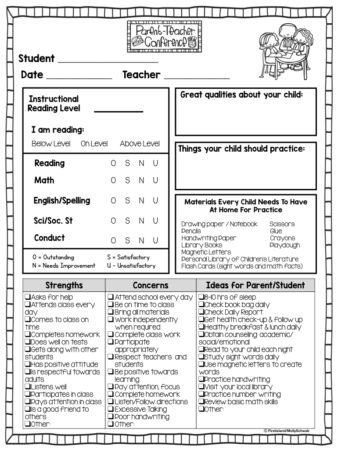Parent teacher conferences – love 'em or hate 'em, they are a necessary part of the job of teaching. Do you struggle to think of things to say? Are you worried you might have to meet with an angry parent? Or possibly have a parent break down and cry? These are things that I've encountered over the years, and although those situations can be challenging, meeting with parents is one of the most important parts of your job as a teacher.

Parent teacher conferences can give you great insight into your students and their background. It's also a great time to get parents on your side, which ultimately helps both the students and you. Here are a few tips to help you have successful parent teacher conferences:
Dress To Impress
First impressions count. Take the time to dress professionally when meeting with a parent. That doesn't mean that you have to go out and buy a brand new suit. But you should wear school appropriate attire. It not only shows respect but also tells parents that you are a professional that they can trust.
Welcoming Environment
Chances are, parents will get to their appointment a few minutes early. Set up a nice area outside your classroom with things they can look at, while they wait for you to finish with other parents. It's always good to have student work samples hanging on a fresh, colorful bulletin board.
Another nice touch is having student journals on display or maybe even a letter from students to parents welcoming them to your class. I like to put examples of my students writing out for parents to view. Do you take classroom photos of your students in action? Why not have a simple slideshow running on a loop out in the hallway. Parents LOVE to see their own children hard at work in a great classroom community!
Parent Before Teacher
Always begin your conference with the simple question “Do you have any concerns or questions before we begin?” This does two things. It lets the parents know that you care what they think and want to help them. Most times parents will say they just want to know how their child is doing in school.
But secondly, it gets their worries off the table. If they do voice a question or concern, you can discuss it right away. Chances are, if they are concerned about something, that's all they want to know about. So if you launch into a big speech about their child before addressing their concern, they may not really be listening or receptive, because they only have one thing on their mind.

Be Prepared
Do your homework before the meeting. Think about what you want to tell parents about their child before the meeting. Be prepared for questions that they may ask you.
I once went to parent conference for my own son. When I asked his teacher what reading level my son was on, she couldn't tell me. When I asked to see some samples of his work, she didn't have any. I can assure you that when I left that meeting, I didn't have a lot of confidence in that teacher and was worried what the year would hold for my son.
Know the answers to important questions. Do you need to have every child's grades memorized? No. But it's a good idea to have a copy of them in front of you, along with their reading level, behavior reports and any other important information you might want to discuss.

Keep It Simple
On average, parent teacher conferences are scheduled in 15-20 minute intervals. That time goes fast! This is not the time to talk about everything little Johnny has done since the first day of school. I like to use a simple form, that I fill out ahead of time, with all my information in a simple concise format. It helps keep my thoughts organized and I don't forget important things I might want to say. You can grab this little freebie here.
Work Samples
It's a great idea to create a folder for each child in your classroom. I like to start this on the first day of school. I keep a hanging file for each student where I keep important papers. This is where you can keep things like notes from parents, behavior reports, work samples (good and bad), progress reports, testing reports, etc. You can use these as discussion points in your conference or even as back up if a parent questions something you are doing or that their child is doing.
I once had a parent come to a conference very upset with me because she said that I sent a note home saying her daughter was destructive. She wanted to know what a 6 year old could possibly be doing that was so bad. I was confused and said I wasn't sure what she was referring to. She insisted that I had sent this note home.
Together, we looked through her file for this “note”. I found what she was referring to and the note actually said her daughter was distracted…..not destructive. She immediately calmed down and realized that I had her child's best interest at heart and we had a very good conference that led to some great ideas to help her daughter. Without that file, I probably would have simply had an angry parent that didn't trust or believe in me.

Take Notes
There are two good reasons to take some notes during your conference with parents. Number one, it's easy to forget or mix things up when you are meeting with multiple parents in the same evening. Keep some post it notes handy to jot down notes or concerns and stick them in your students files. This will make it easy for you to go back, when you have time, to revisit.
Number two, it also lets parents know that you value this time and that you will be sure to address any concerns they may have. It also gives you proof, should the need arise, if you need to go back and say “Remember when we discussed this at our conference?”

Be Nice
Finally, and most important of all, treat parents kindly. Remember that this is their child that you are talking about. No parent wants to hear that their child is struggling in school or misbehaving. Every parent wants to hear good things about their kids….so make sure you tell them something good in between those concerns.
I always like to begin my conference with a happy story or something that I am proud of their child for doing in class. Build them up and let them know you really like their little boy or girl and are happy that they are in your class.
Save the concerns for the middle of the conference and always try to end on a positive note. This will build trust between you and the parent and have them leave knowing that their child is in good hands.
Want to make sure you remember these tips? Be sure to pin for later!




